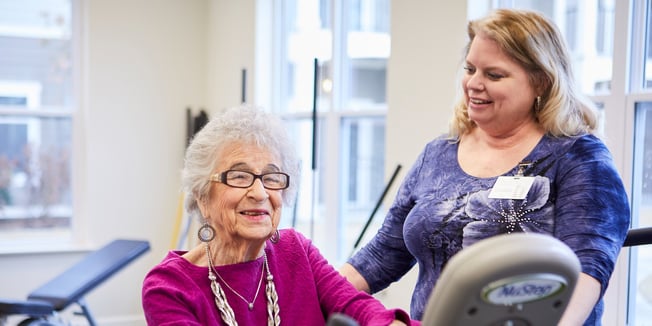How to Develop Your Career Path in Senior Living

Do you have a big heart and a desire to help others? Look no farther than a senior living career path.
A career in this field can be rewarding because you’ll go to work each day knowing that you can make a difference in someone’s life. It’s also a stable field with numerous areas for growth and different career paths available. As you look at various senior living roles, you can be confident that there are plenty of ways to learn and grow in each.
To make the most of your opportunities, we’ve compiled a list of tips on how to develop your career in senior living.
Tips for Developing Your Senior Living Career Path
Getting started on a new career path is exciting, especially when it is your calling in life. Taking those first steps on the path may seem difficult, but it doesn’t have to be. We’ve compiled a few considerations to keep in mind.
1. Considering Part-Time Opportunities
All experience in the field is valuable to your professional growth, so don’t be afraid to take on a part-time role to start your senior living career path. This can help you get a foot in the door and give you an idea of which role on the team you may like the most.
Senior living communities hire for a variety of roles such as food service, life enrichment, operations, caregivers and nurses, administrative support, and environmental services. Each role is important to the residents’ experiences and the community’s overall success.
Senior living communities also hire people from various career backgrounds, including college students who need part-time work and family caregivers transitioning back into the workforce. The potential for part-time opportunities means that you can gain valuable experience while you determine which full-time role is right for you.
Working part-time also provides the opportunity to learn more about the community where you’re working to determine if it is a good fit in the long term. It’s vital to gather this information about the types of roles where you might thrive and the communities where you might flourish as you’re narrowing down where you want your career to go in the future.
2. Applying and Interviewing for a Senior Living Position
Once you’ve found a position and community you’re interested in, review your qualifications to make sure they align with the job description and requirements. Thoroughly and completely update your resume, including relevant volunteer experience and jobs that demonstrate patience, a desire to serve, and organizational skills.
If you get a call for an interview, think of it as an opportunity to get to know the community and make sure it’s a good fit for you as well as them. Take the time to think about your answers carefully, and ask thoughtful questions of your own.
When you’re visiting the community, observe what it’s like: How do the team members treat residents and each other? Do the residents seem like they are well cared for? Your observations can help you determine a lot about the community and whether you’d be proud to work there.
3. Training Opportunities
Once you’re hired at a community, you will have orientation training. In high-quality communities, you’ll also have ongoing education opportunities. These courses generally share the best practices for your job role
Make sure to take advantage of these learning opportunities when they are offered. Although they may only take an hour out of your work day, they are full of important information that will help you in your professional development. If you’re an active and engaged participant in these courses, you’ll understand the material more deeply and further your professional journey. You’ll get out what you put in, so take notes, engage in discussions, and implement what you’re learning into your daily work.
4. Pursuing a College Education
Once you are settled in your role, you may find that you want to learn more about certain topics to advance your career and improve your job performance. College courses can be a valuable opportunity to take the next step. Pursuing a degree in nursing, hospitality, or recreation can open up your senior living career opportunities, but for some roles, you may only need to take a few courses for your professional development.
Before applying and enrolling, ask your community if tuition reimbursement is offered for ongoing education. The community may not pay for all of your schooling, but what they cover can offset some of the costs.
5. Assessing and Growing Your Skill Sets
Determine what your skills and talents are as well as where you could improve. Ask a supervisor for feedback as you make this assessment. Determining your strengths provides a template for working on areas that need improvement, which could open up your career path.
If you want to learn new skills, ask your supervisor if there are cross-training opportunities available. Senior living communities offer a wide variety of positions, which means employees can showcase their skills and talents in various ways in the community. It also means team members can try out different positions, boosting creativity while preventing burnout.
6. Create a Development Plan with Your Supervisor
A development plan will give your senior living career path more structure and provide you with a clearer vision of what you want to do in your career—and how to get there. Your supervisor may create a career development plan with you shortly after you start working at the community. If not, make sure to reach out and ask about creating one.
It’s important to be vocal. Communication with your supervisor is essential to creating a successful development plan. Let your supervisor know about your desire to grow your career within the community. To help you feel as successful as possible in developing your career path, make sure to provide your input on your development plan. It’s worth the time to meet with your supervisor and talk through your career goals, personal strengths, and weaknesses.
Ready to Start Your Senior Living Career Path?
Make sure the community you’re applying to is the right fit for you—one that invests as much in its team members as its residents, with opportunities for career growth. You’ll feel a lot more engaged with your role if you’re working with an organization that values you and your goals while you nurture your dreams.
At Cedarhurst Senior Living, we’re committed to supporting our employees and providing an environment that encourages our employees to grow. Interested in learning what our communities have to offer? Check out our career listing to learn about the positions we have available in a community near you. We look forward to hearing from you!






.png?width=307&height=200&name=Blog%20%2333%201400%20x%20700%20(1).png)

.png?width=307&height=200&name=Blog%20%2332%201400%20x%20700%20(8).png)



